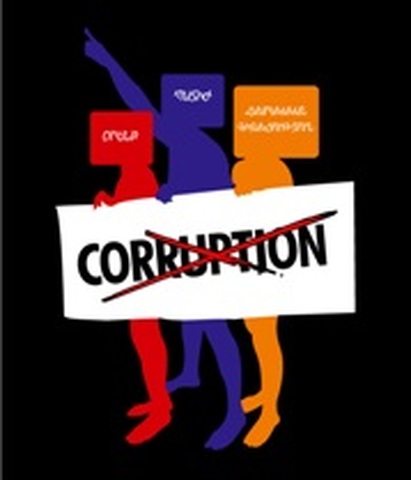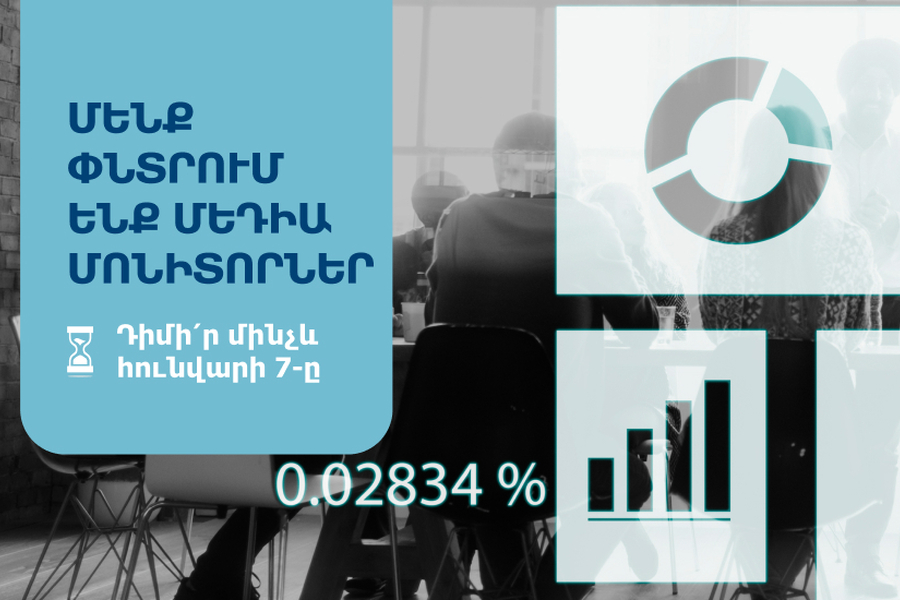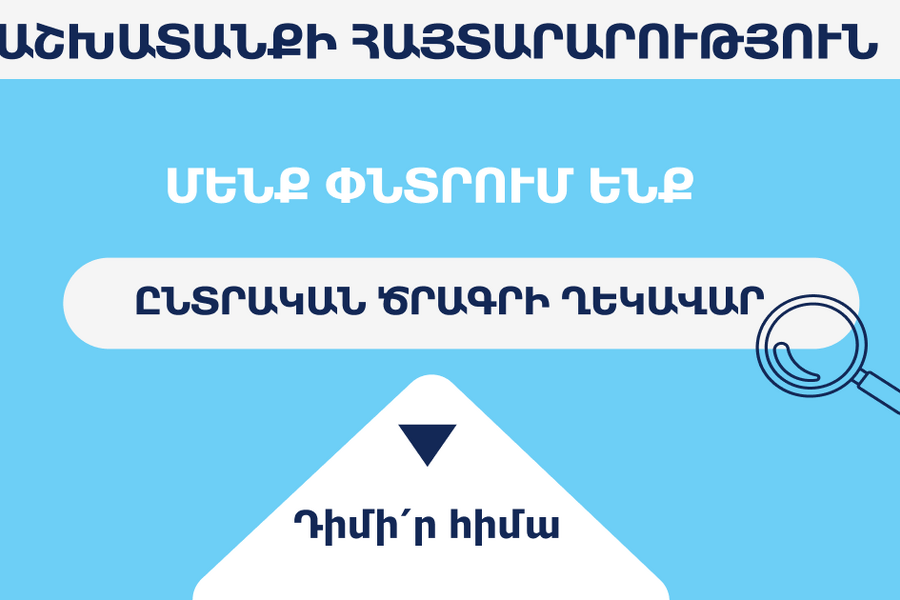Statement of Transparency International Anti-corruption Center on International Anti-Corruption Day 2012
10.12.2012
Yerevan, December 10, 2012 - December 9 is the International Anti-Corruption Day. For those individuals and organizations, who fight against this evil this day serves not only as a pretext for voicing about the achievements and setbacks in this fight in their countries, but also for reflecting about the future endeavors and challenges.
In this sense the year of 2012 was rather insightful. Following the stormy events of 2011, such as Arab Spring, "Occupy" movements, crisis of euro zone and others, it gave rise to optimistic sentiments that the governments, who became the targets of those movements, or new political forces, who came to power as a result of those movements would learn the needed lessons and would carry out a decisive fight against a number of intolerable negative phenomena, including corruption. However, when the situation calmed down, it became clear that both the old rulers, who barely survived the waves of those protests, and the new ones, who came to power as a result of those protests, are not ready to carry out radical reforms.
Studies carried out by several reputable international organizations, among them Transparency International (TI) international anti-corruption movement, reveal that the levels of corruption and abuse of power in the most part of the countries in the world continue to remain high. In particular, more than two thirds of 176 countries included in the TI 2012 Corruption Perception Index (CPI) ranking scored less, than 50 on a scale from 0 to 100.1 This means that corruption in the public sectors of those countries is a serious problem. Thus, it is not surprising that the masses, being deeply disappointed from the new governments in Egypt and Tunisia, who were the first "swallows" of Arab Spring, once more poured into the streets demanding their replacement. The all-embracing wave of protests and strikes continues shaking Spain, Italy, Greece and other countries of euro zone.
Against the background of these developments, Armenia's almost unchanged CPI score2 and even recording progress in CPI ranking3 , at the first glance seem to be not a bad indicator. Also, considering the statements made in the recent months by Armenian authorities, which were assuring their decisiveness to fight corruption in deeds not in words (in particular, statements to "seize the head of the fish", manifest surgical approach towards corruption and others), as well as more frequent meetings with relevant stakeholders, one could assume that the situation in our country even is improving.
Transparency International Anti-corruption Center (TIAC) has its reservations in assessing the current developments and official statements of Armenian authorities. First, Armenia's 2012 CPI score is equal to 34, which means that Armenian businesses and experts, as well as businesses dealing with Armenia and experts on Armenia continue to perceive the country's public sector as a highly corrupt sphere. Therefore, instead of being upbeat from the fact that the situation with corruption in Armenia is slightly better, than in some of its neighboring countries, such as Azerbaijan (with CPI score 27) or Iran (28), one should be concerned that it is much worse, than in Armenia's other neighboring countries, such as Turkey (49) or Georgia (52).
Besides that in 2012 all route causes of corruption, which have been persistently pointed out by TIAC, continued to manifest themselves with the same strength, as previously.
The economy and business remain monopolized. In particular, such manifestations of political corruption, as widespread vote bribing and abuse of administrative resources in their various forms, which took place during this year parliamentary and local self-government elections, were consequences of the monopolization of the political sphere.
The year of 2012 did not produce turnaround also in another route cause of corruption in Armenia, namely, the convergence of business and political elites. The number of parliamentarians and high ranking public officials from the executive branch of the government, who are involved in business activities, continues to remain impressive.
This year the public witnessed a number of unfair and politically motivated verdicts passed by Armenian courts. The main reason for this is the lack of independence of the judiciary, which inevitably corrupts this system. Not surprisingly, this reality continues to be reflected in public perceptions.
Despite of some cases, which heralded the fight against corruption, in general, the law enforcement bodies remain inactive in detecting and punishing the perpetrators of corruption. Information disclosing the involvement of high ranking public officials in corrupt dealings is neglected, thus furthering their impunity.
However, the most disappointing revelation of the passing year was the exacerbation of the level of tolerance towards corruption in the society and readiness of the most of its members to get involved in its vicious chain. That was most vividly manifested during the last parliamentary elections.
Without true and decisive fight against corruption and active involvement of the Armenian society in that fight, it will be impossible to overcome the widespread poverty and impunity in the country, which entail to violations of human rights, deepen the atmosphere of apathy and stimulate exodus of the population. An encouraging start in the fight against corruption could be the appropriate conduct of 2013 presidential elections, ensuring fair elections free from abuse of administrative resources and fraud. In this context, the best surgical interference to curb corruption will be cleaning the voters' lists from the voters absent from the country on the eve of coming presidential elections and publicizing the signed voters' lists after the elections.
1 - On the CPI 0 to 100 scale, 0 means as perceived absolutely corrupt and 100 is absolutely clean from corruption public sector.
2 - With the new methodology and new scale adopted by TI, Armenia's CPI score in 2012 is 34, while its 2011 score was 33.
3 - Based on the 2011 and 2012 CPI scores calculated using the new methodology and scale Armenia advanced from 110th to 105th place in CPI ranking. This is due to the fact that in a number of countries, which scored last year little bit better, than Armenia, the situation with corruption substantially worsened this year.
In this sense the year of 2012 was rather insightful. Following the stormy events of 2011, such as Arab Spring, "Occupy" movements, crisis of euro zone and others, it gave rise to optimistic sentiments that the governments, who became the targets of those movements, or new political forces, who came to power as a result of those movements would learn the needed lessons and would carry out a decisive fight against a number of intolerable negative phenomena, including corruption. However, when the situation calmed down, it became clear that both the old rulers, who barely survived the waves of those protests, and the new ones, who came to power as a result of those protests, are not ready to carry out radical reforms.
Studies carried out by several reputable international organizations, among them Transparency International (TI) international anti-corruption movement, reveal that the levels of corruption and abuse of power in the most part of the countries in the world continue to remain high. In particular, more than two thirds of 176 countries included in the TI 2012 Corruption Perception Index (CPI) ranking scored less, than 50 on a scale from 0 to 100.1 This means that corruption in the public sectors of those countries is a serious problem. Thus, it is not surprising that the masses, being deeply disappointed from the new governments in Egypt and Tunisia, who were the first "swallows" of Arab Spring, once more poured into the streets demanding their replacement. The all-embracing wave of protests and strikes continues shaking Spain, Italy, Greece and other countries of euro zone.
Against the background of these developments, Armenia's almost unchanged CPI score2 and even recording progress in CPI ranking3 , at the first glance seem to be not a bad indicator. Also, considering the statements made in the recent months by Armenian authorities, which were assuring their decisiveness to fight corruption in deeds not in words (in particular, statements to "seize the head of the fish", manifest surgical approach towards corruption and others), as well as more frequent meetings with relevant stakeholders, one could assume that the situation in our country even is improving.
Transparency International Anti-corruption Center (TIAC) has its reservations in assessing the current developments and official statements of Armenian authorities. First, Armenia's 2012 CPI score is equal to 34, which means that Armenian businesses and experts, as well as businesses dealing with Armenia and experts on Armenia continue to perceive the country's public sector as a highly corrupt sphere. Therefore, instead of being upbeat from the fact that the situation with corruption in Armenia is slightly better, than in some of its neighboring countries, such as Azerbaijan (with CPI score 27) or Iran (28), one should be concerned that it is much worse, than in Armenia's other neighboring countries, such as Turkey (49) or Georgia (52).
Besides that in 2012 all route causes of corruption, which have been persistently pointed out by TIAC, continued to manifest themselves with the same strength, as previously.
The economy and business remain monopolized. In particular, such manifestations of political corruption, as widespread vote bribing and abuse of administrative resources in their various forms, which took place during this year parliamentary and local self-government elections, were consequences of the monopolization of the political sphere.
The year of 2012 did not produce turnaround also in another route cause of corruption in Armenia, namely, the convergence of business and political elites. The number of parliamentarians and high ranking public officials from the executive branch of the government, who are involved in business activities, continues to remain impressive.
This year the public witnessed a number of unfair and politically motivated verdicts passed by Armenian courts. The main reason for this is the lack of independence of the judiciary, which inevitably corrupts this system. Not surprisingly, this reality continues to be reflected in public perceptions.
Despite of some cases, which heralded the fight against corruption, in general, the law enforcement bodies remain inactive in detecting and punishing the perpetrators of corruption. Information disclosing the involvement of high ranking public officials in corrupt dealings is neglected, thus furthering their impunity.
However, the most disappointing revelation of the passing year was the exacerbation of the level of tolerance towards corruption in the society and readiness of the most of its members to get involved in its vicious chain. That was most vividly manifested during the last parliamentary elections.
Without true and decisive fight against corruption and active involvement of the Armenian society in that fight, it will be impossible to overcome the widespread poverty and impunity in the country, which entail to violations of human rights, deepen the atmosphere of apathy and stimulate exodus of the population. An encouraging start in the fight against corruption could be the appropriate conduct of 2013 presidential elections, ensuring fair elections free from abuse of administrative resources and fraud. In this context, the best surgical interference to curb corruption will be cleaning the voters' lists from the voters absent from the country on the eve of coming presidential elections and publicizing the signed voters' lists after the elections.
1 - On the CPI 0 to 100 scale, 0 means as perceived absolutely corrupt and 100 is absolutely clean from corruption public sector.
2 - With the new methodology and new scale adopted by TI, Armenia's CPI score in 2012 is 34, while its 2011 score was 33.
3 - Based on the 2011 and 2012 CPI scores calculated using the new methodology and scale Armenia advanced from 110th to 105th place in CPI ranking. This is due to the fact that in a number of countries, which scored last year little bit better, than Armenia, the situation with corruption substantially worsened this year.






